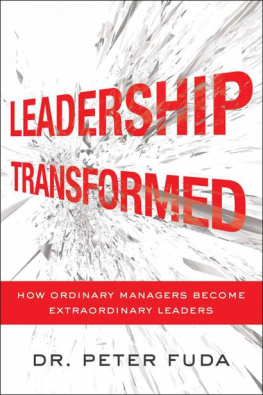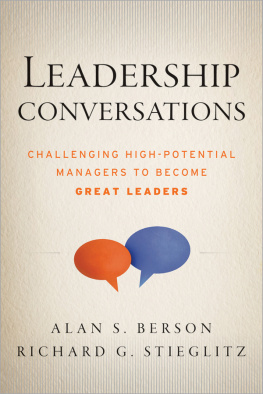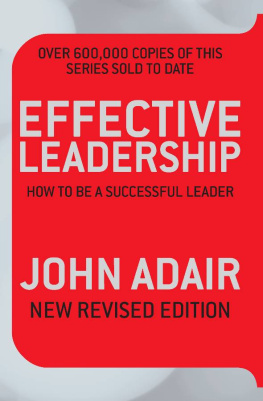Fuda - Leadership Transformed: How Ordinary Managers Become Extraordinary Leaders
Here you can read online Fuda - Leadership Transformed: How Ordinary Managers Become Extraordinary Leaders full text of the book (entire story) in english for free. Download pdf and epub, get meaning, cover and reviews about this ebook. year: 2013, publisher: New Harvest, genre: Business. Description of the work, (preface) as well as reviews are available. Best literature library LitArk.com created for fans of good reading and offers a wide selection of genres:
Romance novel
Science fiction
Adventure
Detective
Science
History
Home and family
Prose
Art
Politics
Computer
Non-fiction
Religion
Business
Children
Humor
Choose a favorite category and find really read worthwhile books. Enjoy immersion in the world of imagination, feel the emotions of the characters or learn something new for yourself, make an fascinating discovery.
Leadership Transformed: How Ordinary Managers Become Extraordinary Leaders: summary, description and annotation
We offer to read an annotation, description, summary or preface (depends on what the author of the book "Leadership Transformed: How Ordinary Managers Become Extraordinary Leaders" wrote himself). If you haven't found the necessary information about the book — write in the comments, we will try to find it.
Fuda: author's other books
Who wrote Leadership Transformed: How Ordinary Managers Become Extraordinary Leaders? Find out the surname, the name of the author of the book and a list of all author's works by series.
Leadership Transformed: How Ordinary Managers Become Extraordinary Leaders — read online for free the complete book (whole text) full work
Below is the text of the book, divided by pages. System saving the place of the last page read, allows you to conveniently read the book "Leadership Transformed: How Ordinary Managers Become Extraordinary Leaders" online for free, without having to search again every time where you left off. Put a bookmark, and you can go to the page where you finished reading at any time.
Font size:
Interval:
Bookmark:


Copyright 2013 by Dr. Peter Fuda
All rights reserved
No part of this book may be reproduced, or stored in a retrieval system, or transmitted in any form or by any means, electronic, mechanical, photocopying, recording, or otherwise, without express written permission of the publisher.
Jacket design by Faceout Studio, Jeff Miller
Cover image Shutterstock Images
Author photograph Neil Fenelon
Published by Amazon Publishing
P.O. Box 400818
Las Vegas, NV 89140
eISBN: 9781477850565
For Kara and Bella, the fuel for my fire
Contents
Read This First
Decades of academic analysis have given us more than 350 definitions of leadership. Literally thousands of empirical investigations of leaders have been conducted in the last 75 years alone, but no clear and unequivocal understanding exists as to what distinguishes leaders from non-leaders and what distinguishes effective leaders from ineffective leaders. WARREN BENNIS AND BURT NANUSI STARTED THE DOCTORAL research that forms the backbone of hard data for this book on December 16, 2005. I can be very precise about this date because it was the same day my wife, Kara, gave birth to our daughter, Isabellaprobably the best excuse ever to leave early on the very first day of class. As I sped toward the hospital, I had time to reflect on why, with a new baby arriving and a rapidly growing consulting business, I had just committed the next five years of my life to serious academic research.
Three things came to mind. First, I was really frustrated with the leadership literature, as highlighted by Bennis and Nanus. Second, I had an expedient (read: selfish) need to make sense of the success I was experiencing in my consulting practice. Third, I wanted to make a significant contribution to the field of leadership, in particular to our understanding of leadership transformation. By transformation, I mean the process by which an ordinary manager becomes an extraordinary leader.
As a committed student of leadership and somebody who had, over the course of twelve years, been fortunate enough to build a healthy business out of an obsession with the subject, I had become more and more frustrated with the literature. In my reading of both academic and practitioner-oriented texts, I struggled with the long lists of qualities and attributes that defined effective leadership, and with the heroic persona that was often attributed to the person sitting atop the organizational hierarchy. It wasnt that I had a problem with the content of these worksthey espoused largely noble attributes like vision, courage, and integrity. The problem was that, after so many years of working very closely with CEOs and senior executives around the world, I had never met the superhero leader described in much of what I read.
Since 2001, the work of my consulting company, The Alignment Partnership (TAP), had been squarely focused on helping leaders transform themselves, their leadership teams, and their organizations. Unlike the ideal leaders presented in the books I was reading, the leaders I was working with were mere mortals doing the best they could under ever-increasing pressure. The question I had personally become obsessed with was What does it take for an ineffective leader to transform into a highly effective leader? I was searching for a substantive work to support and accelerate my own efforts, a work that laid out a clear road map for transformation in leaders.
Meanwhile, I was personally witnessing transformations unfold quite frequently. Over our first five years in business, my company had grown in stature and reputation following our publication of case studies of success in multinational companies like MasterCard, Bayer, and Dun & Bradstreet, and in the public sector with the government of Hong Kong. In fact, by 2005 we had a dozen case studies of organizational transformation, and more than a hundred stories of leadership transformation involving CEOs and senior executives. As a result, I was already feeling friendly pressure from the consulting community, the business media, and academia to disclose our transformation formula.
This attention was flattering but, given the often-quoted statistic that more than 70 percent of all change efforts end in failure, not entirely surprising. It was also very uncomfortable for me, mostly because I had little idea how to respond. I could describe the tools and frameworks we used and the interventions we ran, but that felt superficial, especially since many of these elements were widely used by consultants around the world. To paraphrase Karl Weick, we can only make sense of life retrospectively, even though it must be lived prospectively. It was time to make sense of our past in order to inform our future.
All through my academic research, I held on to the hope that my results would help me make sense of our work, and eventually allow me to establish and refine processes that would improve our practice. I would then share those insights with leaders and consultants around the world across a range of platforms, from management journals to speaking engagements to, perhaps, a book.
Along with my supervising professor, Richard Badham, and my research assistant, Skye Phillips, my big dream was to produce a work of sufficient quality that it could be published in the Harvard Business Review , a journal I had read religiously every month for some fifteen years. In November 2011, this dream came true when HBR published Fire, Snowball, Mask, Movie: How Leaders Spark and Sustain Change, based on our research findings. This outcome further encouraged me to share our insights in greater depth in a book-length workthe one you are holding right now.
As we were shaping our approach to the research, Richard and I had the good fortune to speak with leadership guru Manfred Kets de Vries following a lecture he gave in 2006. We asked him what model he used in his leadership transformation initiatives, and he admitted that he acted as a bricoleur , one who selects, mixes, and adapts his materials in an iterative process of exploring what works in a given context. This was, in fact, very much the approach I had been taking in my consulting work, but I had not yet made the direct connection to my research.
Until this point, I had assumed that the goal of my research was to come up with some universal type of formula for leadership transformation, even though finding such a formula was at odds with my beliefs and actual practice. But with Kets de Vriess words ringing in my ears, I realized that leadership transformation was something that could only ever be understood holisticallythrough the subtleties, nuances, and idiosyncrasies of the protagonists involved. So Richard, Skye, and I chose to go down a very different path from the formula-driven texts that we all found so frustrating. It proved liberating.
Our original research centered on seven leaders of CEO status from my management consulting practice. Their success in transforming themselves, their leadership teams, and their organizations had been well documented. They had seen radical improvement in 360-degree feedback on their personal effectiveness and the effectiveness of their teams, along with significant gains for their organizations in measures like financial performance, customer approval, and employee engagement.
Based on my level of intimacy and trust with each of these leadersdeveloped over many years of working closely together through good times and badI sought to develop a rich and contextual understanding of leadership transformation through their eyes. Their humility and their willingness to be vulnerable was paramount to the findings, with each leader giving me license to tell the warts and all version of the story.
Next pageFont size:
Interval:
Bookmark:
Similar books «Leadership Transformed: How Ordinary Managers Become Extraordinary Leaders»
Look at similar books to Leadership Transformed: How Ordinary Managers Become Extraordinary Leaders. We have selected literature similar in name and meaning in the hope of providing readers with more options to find new, interesting, not yet read works.
Discussion, reviews of the book Leadership Transformed: How Ordinary Managers Become Extraordinary Leaders and just readers' own opinions. Leave your comments, write what you think about the work, its meaning or the main characters. Specify what exactly you liked and what you didn't like, and why you think so.







